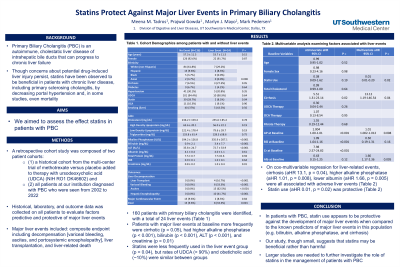Tuesday Poster Session
Category: Liver
P4630 - Statins Protect Against Major Liver Events in Patients With Primary Biliary Cholangitis
Tuesday, October 29, 2024
10:30 AM - 4:00 PM ET
Location: Exhibit Hall E

Has Audio

Meena M. Tadros, BS
University of Texas Southwestern Medical Center
Dallas, TX
Presenting Author(s)
Meena M. Tadros, BS1, Prajwal Gowda, BS1, Mark Pedersen, MD1, Marlyn J. Mayo, MD, FACG2
1University of Texas Southwestern Medical Center, Dallas, TX; 2University of Texas Southwestern, Dallas, TX
Introduction: Primary Biliary Cholangitis (PBC) is an autoimmune, cholestatic liver disease of intrahepatic bile ducts that, if untreated, progresses to chronic liver failure and death. In patients with cirrhosis, statins have been shown to be potentially beneficial by decreasing portal hypertension and mortality a finding seen again recently in an analysis of patients with primary sclerosing cholangitis. We aim to assess the effect statins in patients with PBC.
Methods: A retrospective cohort study was composed of two patient cohorts: (1) a historical cohort from the multi-center trial of methotrexate versus placebo added to therapy with ursodeoxycholic acid (UDCA) (NIH RO1 DK46602) and (2) all patients at our institution diagnosed with PBC who were seen from 2002 to 2022. Historical, laboratory, and outcome data was collected on all patients to evaluate factors predictive and protective of major liver events (composite endpoint including decompensation [variceal bleeding, ascites, and portosystemic encephalopathy], liver transplantation, and liver-related death).
Results: 160 patients with PBC were identified, with a total of 24 liver events (Table 1). Patients with major liver events at baseline more frequently were cirrhotic (p = 0.05), had higher alkaline phosphatase (p < 0.001), bilirubin (p < 0.001), ALT (p < 0.001), and creatinine (p = 0.01). Statins were less frequently used in the liver event group (p = 0.04), but rates of UDCA ( > 90%) and obeticholic acid (~10%) were similar between groups. No patients were on fibrates (Table 1). On cox-multivariable regression for liver-related events, cirrhosis (aHR 13.1, p = 0.04), higher alkaline phosphatase (aHR 1.01, p = 0.008), lower albumin (aHR 1.66, p = 0.005) were all associated with adverse liver events. Statin use (aHR 0.01, p = 0.02) was protective.
Discussion: In patients with PBC, statin use appears to be protective against the development of major liver events when compared to the known predictors of major liver events in this population (e.g. bilirubin, alkaline phosphatase, and cirrhosis). Practitioners are often hesitant to prescribe statins to patients with liver disease out of concern for hepatotoxicity. Our study, though small, suggests that statins may be beneficial rather than harmful. Larger studies are needed to further investigate the role of statins in the management of patients with PBC.
Note: The table for this abstract can be viewed in the ePoster Gallery section of the ACG 2024 ePoster Site or in The American Journal of Gastroenterology's abstract supplement issue, both of which will be available starting October 27, 2024.
Disclosures:
Meena M. Tadros, BS1, Prajwal Gowda, BS1, Mark Pedersen, MD1, Marlyn J. Mayo, MD, FACG2. P4630 - Statins Protect Against Major Liver Events in Patients With Primary Biliary Cholangitis, ACG 2024 Annual Scientific Meeting Abstracts. Philadelphia, PA: American College of Gastroenterology.
1University of Texas Southwestern Medical Center, Dallas, TX; 2University of Texas Southwestern, Dallas, TX
Introduction: Primary Biliary Cholangitis (PBC) is an autoimmune, cholestatic liver disease of intrahepatic bile ducts that, if untreated, progresses to chronic liver failure and death. In patients with cirrhosis, statins have been shown to be potentially beneficial by decreasing portal hypertension and mortality a finding seen again recently in an analysis of patients with primary sclerosing cholangitis. We aim to assess the effect statins in patients with PBC.
Methods: A retrospective cohort study was composed of two patient cohorts: (1) a historical cohort from the multi-center trial of methotrexate versus placebo added to therapy with ursodeoxycholic acid (UDCA) (NIH RO1 DK46602) and (2) all patients at our institution diagnosed with PBC who were seen from 2002 to 2022. Historical, laboratory, and outcome data was collected on all patients to evaluate factors predictive and protective of major liver events (composite endpoint including decompensation [variceal bleeding, ascites, and portosystemic encephalopathy], liver transplantation, and liver-related death).
Results: 160 patients with PBC were identified, with a total of 24 liver events (Table 1). Patients with major liver events at baseline more frequently were cirrhotic (p = 0.05), had higher alkaline phosphatase (p < 0.001), bilirubin (p < 0.001), ALT (p < 0.001), and creatinine (p = 0.01). Statins were less frequently used in the liver event group (p = 0.04), but rates of UDCA ( > 90%) and obeticholic acid (~10%) were similar between groups. No patients were on fibrates (Table 1). On cox-multivariable regression for liver-related events, cirrhosis (aHR 13.1, p = 0.04), higher alkaline phosphatase (aHR 1.01, p = 0.008), lower albumin (aHR 1.66, p = 0.005) were all associated with adverse liver events. Statin use (aHR 0.01, p = 0.02) was protective.
Discussion: In patients with PBC, statin use appears to be protective against the development of major liver events when compared to the known predictors of major liver events in this population (e.g. bilirubin, alkaline phosphatase, and cirrhosis). Practitioners are often hesitant to prescribe statins to patients with liver disease out of concern for hepatotoxicity. Our study, though small, suggests that statins may be beneficial rather than harmful. Larger studies are needed to further investigate the role of statins in the management of patients with PBC.
Note: The table for this abstract can be viewed in the ePoster Gallery section of the ACG 2024 ePoster Site or in The American Journal of Gastroenterology's abstract supplement issue, both of which will be available starting October 27, 2024.
Disclosures:
Meena Tadros indicated no relevant financial relationships.
Prajwal Gowda indicated no relevant financial relationships.
Mark Pedersen indicated no relevant financial relationships.
Marlyn Mayo: CymaBay, a Gilead Sciences Company – Consultant. GSK – Consultant. Intra-Sana – Consultant. Ipsen – Consultant. Mirum – Consultant. Target Pharmasolutions – Consultant.
Meena M. Tadros, BS1, Prajwal Gowda, BS1, Mark Pedersen, MD1, Marlyn J. Mayo, MD, FACG2. P4630 - Statins Protect Against Major Liver Events in Patients With Primary Biliary Cholangitis, ACG 2024 Annual Scientific Meeting Abstracts. Philadelphia, PA: American College of Gastroenterology.
